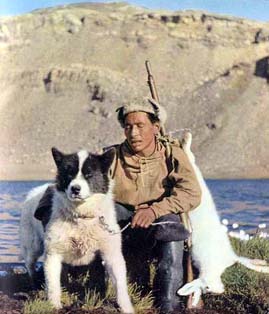Table of Contents
Thanking our Sponsors
Featured Inuit Dog Owner: Tim Socha
Inuit Dogs in New Hampshire, Part I
Nunavut Quest 2001
Uummannaq: A Special Dog Sledge Expedition
Remembrances of a Spent Life: "Chimo"
Dog News from Iqaluit
The Homecoming, Part III
Fan Hitch Wins Writing Contest Recognition
Product Review: Seeing the Light
Media Review: The Last Husky
Tip for the Trail: A Do-It Yourself Alcohol Heater
IMHO: Looking Forward
Navigating This
Site
Index of articles by subject
Index
of back issues by volume number
Search The
Fan Hitch
Articles
to download and print
Ordering
Ken MacRury's Thesis
Our
comprehensive list of resources
Talk
to The Fan
Hitch
The Fan
Hitch home page
ISDI
home page
Editor: Sue Hamilton
Webmaster: Mark Hamilton
Contents of The Fan Hitch Website and its publications are protected by international copyright laws. No photo, drawing or text may be reproduced in any form without written consent. Webmasters please note: written consent is necessary before linking this site to yours! Please forward requests to Sue Hamilton, 55 Town Line Rd., Harwinton, Connecticut 06791, USA or mail@thefanhitch.org

1960 photo of a Russian Inuk out
hunting with his dog.
From "Dogs", published by Barbara
Woodhouse.
Photograph by Bavaria Verlag.
The Russian Connection
Reading the February 16th internet version of the Nunatsiaq News, I came across an article describing the desperate situation of the people of the Chukotka region in Arctic Russia. Denise Rideout reported that the Canadian Office of the Inuit Circumpolar Conference (ICC) as well as the North Slope Borough of Alaska were planning to donate hunting, fishing and trapping supplies so that these Chukotkan Inuit could harvest traditional food to eat. There have already been reports of deaths due to starvation. Apparently with the Russian economy in such bad shape, assistance to the region has been cut off. Villages have gone days in winter without heat or electricity and villagers with government jobs haven't been paid in years. It is hoped that short term humanitarian aid will be replaced by new programs. There is newly elected political leadership in the region which is taking an interest in helping these aboriginal people. Additionally, the ICC and the "Russian Association of Indigenous peoples of the North are working together to start a multi-million dollar, multi-year program in the Russian Arctic that will train indigenous people."
Of course, the rescue of the Russian Inuit people is of preeminent importance, taking precedence above all other regional issues. However, I can't help but reflect on the plans of the Russian Restoration Center for Northern Dogs to visit the region in hopes of finding examples of pure Inuit Dogs to use for the development of a breed restoration project (see Fan Hitch volume 3, number 1, November 2000). If their undertaking could be successful, and specimens eventually returned to their origins, Russian Inuit could return to the survival ways of the past, teaching the younger generations the old ways. I hope it is not too late to rescue both the people and their dogs.
These events are still unfolding.
Wishing you smooth ice and narrow leads.
Sue